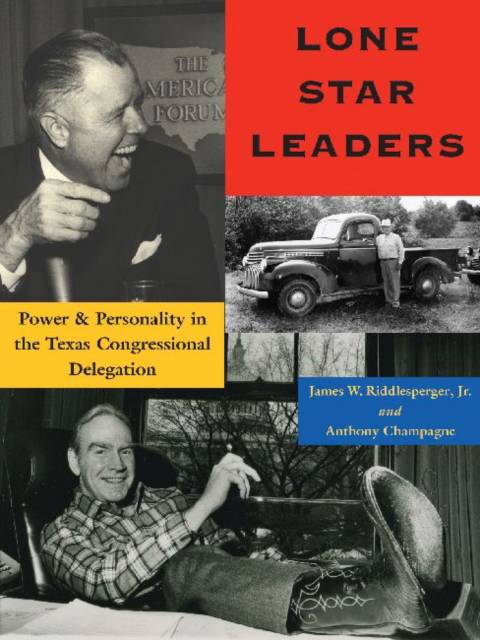
En raison d'une grêve chez bpost, votre commande pourrait être retardée. Vous avez besoin d’un livre rapidement ? Nos magasins vous accueillent à bras ouverts !
- Retrait gratuit dans votre magasin Club
- 7.000.000 titres dans notre catalogue
- Payer en toute sécurité
- Toujours un magasin près de chez vous
En raison de la grêve chez bpost, votre commande pourrait être retardée. Vous avez besoin d’un livre rapidement ? Nos magasins vous accueillent à bras ouverts !
- Retrait gratuit dans votre magasin Club
- 7.000.0000 titres dans notre catalogue
- Payer en toute sécurité
- Toujours un magasin près de chez vous
Lone Star Leaders
Power and Personality in the Texas Congressional Delegation
James W Riddlesperger, Anthony Champagne
Livre relié | Anglais
48,95 €
+ 97 points
Description
Texas' political power really began in the late nineteenth century, when Texas congressmen first began to wield power as committee chairs and party leaders. In the era of Woodrow Wilson, Texas clout intensified as Senator Morris Sheppard introduced the Prohibition legislation with which his name is associated today. John Nance Garner's political influence was first felt in the Wilson administration, as a liaison on war matters between the administration and the House, then grew in the Hoover era when Garner rose to minority leadership and critic of Hoover administration policies.
In the Roosevelt era, Texas was a Democratic state and, with Democratic control of Congress and a Democratic president, the state's power grew--John Garner became vice president in 1933, and Texans chaired six House committees: Agriculture, Interstate and Foreign Commerce, Judiciary, Public Buildings, Rivers and Harbors, and Territories. And during the Eisenhower years, Lyndon Johnson, Sam Rayburn's protégé, became minority and then majority leader of the Senate. It was an extraordinary time with Texans in the top leadership of both the House and the Senate. This book is the story of the men and women who represented Texas in Congress. For a century and a quarter they were masters of congressional politics and represented Texas on the national stage. Authors Jim Riddlesperger and Tony Champagne paint lively pictures of the characters--party leaders, committee chairs, and the political pioneers--who made Texas a major player in congressional politics for the past 125 years, as well as the ideologues and the buffoons that are also part of the Texas congressional story.Spécifications
Parties prenantes
- Auteur(s) :
- Editeur:
Contenu
- Nombre de pages :
- 256
- Langue:
- Anglais
Caractéristiques
- EAN:
- 9780875654188
- Date de parution :
- 16-09-11
- Format:
- Livre relié
- Format numérique:
- Genaaid
- Dimensions :
- 233 mm x 312 mm
- Poids :
- 1329 g

Les avis
Nous publions uniquement les avis qui respectent les conditions requises. Consultez nos conditions pour les avis.






